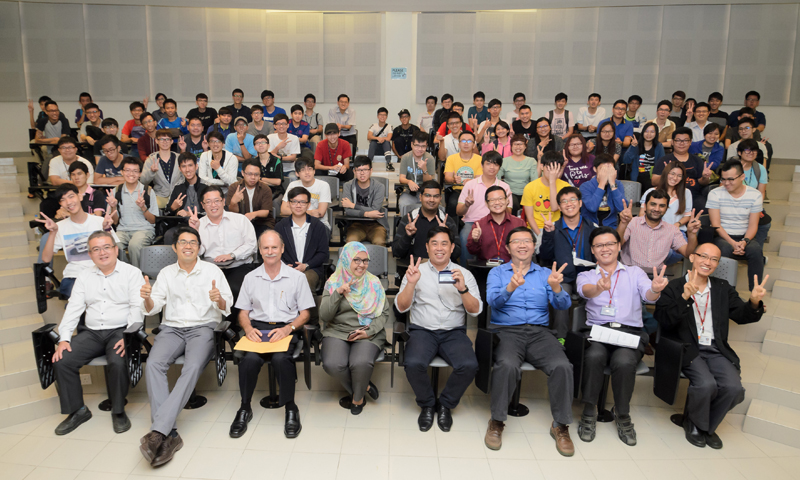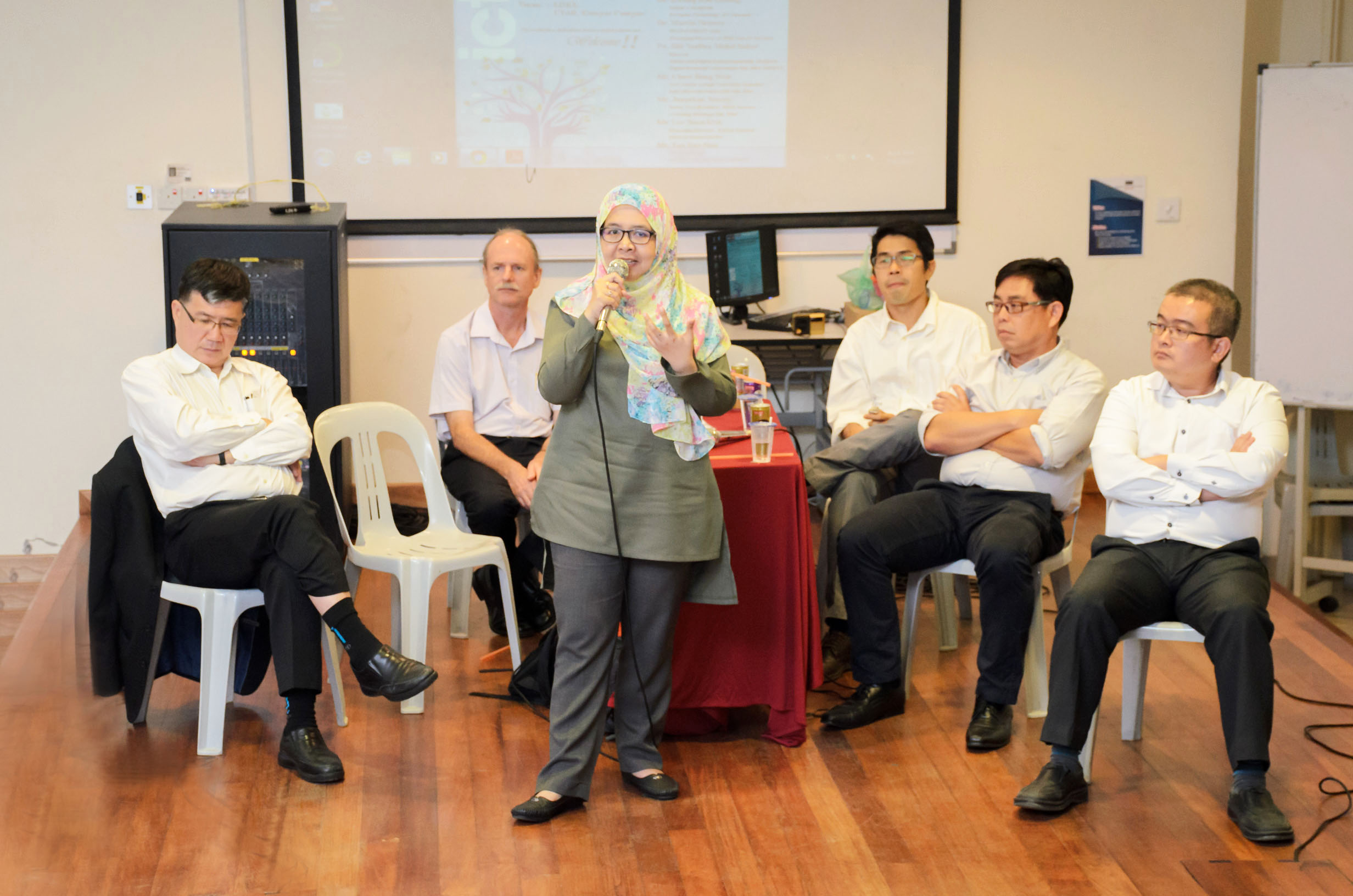


Front row from left: Dr Kwong, Chew, Searcy, Norliza, Tan, Dr Liew, Dr Cheng and Department of Computer and Communication Technology Head Dr Goh Hock Guan with the participants
Following the fruitful 2016 forum, the Faculty of Information and Communication Technology (FICT) once again organised a forum titled “Digital Economy of Malaysia 2017 and Beyond: What are the trends and opportunities?”, which took place on 4 July 2017 at the Kampar Campus.
The forum saw the presence of panellists, namely Recogine Technology and EV-Dynamic Senior Consultant Dr Kwong Kae Hsiang, Intel Microelectronics (M) Sdn Bhd System on Chip (SOC) Senior Design Validation Manager Chew Beng Wah, E-Genting Holdings Sdn Bhd Senior Vice President of the R&D Systems department Jonathan Searcy, KEDA Limited Managing Director and Association of the Computer and Multimedia Industry of Malaysia (PIKOM) Representative Lee Boon Kok, Malaysia Digital Economy Corporation Sdn. Bhd. (MDEC) Talent & Digital Entrepreneurship Director Siti Norliza Mohd Sahar, and MyTRIZ Vice President and InnoPlanet Consultant Tan Eng Hoo. Also present at the forum were FICT Dean Assoc Prof Dr Liew Soung Yue, and FICT Deputy Dean for Academic Development and Undergraduate Programmes and Organising Chairperson Dr Cheng Wai Khuen, along with staff and students.
With the objectives for participants to gain the latest information about the industry, for participants to communicate with the industry leaders, and to share tips with the participants on securing a good job placement, the forum began with Dr Kwong sharing his thoughts on how Information and Communication Technology (ICT) has been so greatly involved in our daily lives, to the extent an individual drives, talks, eats, sleeps, and shops through e-commerce sites.
At that point, Dr Kwong mentioned that e-commerce has brought conveniences and simplicity to mankind’s lives, but he questioned the long-term result of e-commerce on Malaysians and if Malaysia has the capacity to fully utilise the system. By referring to China, he pointed out that China’s manufacturing capacity has enabled that country to effectively utilise e-commerce. He hopes that Malaysia will be able to use its large food and agriculture industry as the niche to utilising e-commerce.
Chew, likewise, has his doubts on whether the old ways of development is suited for the current digital economy. He mentioned that in order to survive the current digital economy, people can no longer rely on result orientated ways nor easily accept instructions from the superiors. Hence, he spoke of the need to consider the culture and current ways used for surviving the digital economy.
Searcy expressed his concern regarding the efficiency of current courier services that enable a single manufacturer to supply globally, and also having the power to control employment. Although intimidating, Searcy still advised the participants, who are interested in doing e-commerce business; to be able to compete with monopolising industry in order to maintain a solid position in the digital economy.
Norliza, on the other hand, mentioned that it was the role of the parents to educate their children about e-commerce, whereby with today’s technology, it has become an open platform for graduates to create their own e-commerce niche.
“Malaysia is not a highly populated country so e-commerce works very well because we can test the sensitivity of the market, and start training import and export,” said Norliza. She also added that the competency of talents must be well managed so that they can be nurtured to be creators and innovators, hence creating their own niche in the e-commerce economy. She believes that UTAR students are potential innovators and encourages the participants to explore their creativity to invent items for e-commerce purpose.
Tan commented that eventually, participants will need to invent items to be sold on e-commerce sites, even if earning initial profit of RM 1. He continued to encourage participants to be involved in e-commerce activities, with the PER guideline – Productivity (input and output), Efficiency (the speed of making a product) and Reach (how far the product can reach).
Lee, too, advised the participants to first experience the e-commerce system in order to identify the problem, only then can they generate creative ideas to improve the system. As for securing better job placements in the industry, he advised the participants to work well with other people and to have good problem-solving skills.
For the forum is also part of the University’s commitment to promote the use of ICT and IT-intensive learning as well as to polish students’ ICT skills for the digital world, Tan’s encouragement for the participants was to dare to take risks, as he pointed out to the fact that internet-related products and services have been growing rapidly. Hence, it is vital for participants to be fully equipped with the digital knowledge.
The forum continued with the panellists discussing on nurturing talents in ICT, where the panellists spoke of the mobile platform, such as the development of new apps and software, as one of the many opportunities for the participants to explore. They even foresee secondary school students having the same capacity, thanks to the advancement of technology.
To reassure the participants, the panellists also advised them not to be afraid of failures and to be ready to take up the challenges that lie ahead. The participants were also told to get updated by doing their research and be more willing to try new things.
The forum then ended with a souvenir presentation by Dr Liew to all the panellists.

Norliza sharing her opinion while the other panellists look on

Clockwise from top left: Dr Liew presenting a token of appreciation to Dr Kwong, Searcy, Chew, Tan and Norliza
© 2019 UNIVERSITI TUNKU ABDUL RAHMAN DU012(A).
Wholly owned by UTAR Education Foundation Co. No. 578227-M LEGAL STATEMENT TERM OF USAGE PRIVACY NOTICE